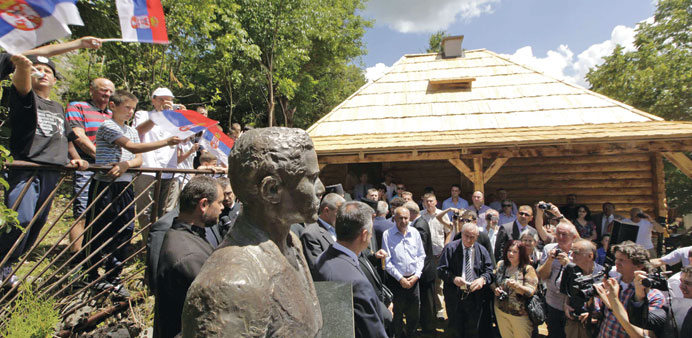Reuters/Sarajevo
Sarajevo marked 100 years yesterday since the murder of an Austrian prince that lit the fuse for World War I, with a concert by the Vienna Philharmonic offering a message of unity to a divided country and a continent tested by social and economic strife.
Broadcast live on dozens of television and radio stations from 6.15pm (1615 GMT), the repertoire was rooted in the days of the Habsburg Empire.
The murder of Archduke Franz Ferdinand, heir to the Austro-Hungarian throne and his wife Sophie on a bright June morning in Sarajevo in 1914 by a 19-year-old Bosnian Serb called Gavrilo Princip set the Great Powers marching to war.
More than 10 million soldiers died and empires crumbled.
Sarajevo closed the century under siege by Bosnian Serb forces during Yugoslavia’s disintegration.
Still dealing with the aftermath, Bosnia’s former warring communities greeted the centennial deeply at odds over Princip’s motives and his legacy.
Leaders of Serbia and the Bosnian Serbs, who consider the assassin a hero, boycotted the Sarajevo events, angered by what they say is an attempt to link the wars that opened and closed the 20th century, and to pin the blame on them.
They planned to re-enact the murder in the eastern Drina river town of Visegrad, seared into the memory of Muslim Bosniaks for a wave of ethnic cleansing by Bosnian Serbs early in the 1992-95 war.
In Sarajevo, Austrian President Heinz Fischer was guest of honour at the concert in the capital’s restored City Hall, known as Vijecnica, where Ferdinand attended a reception on June 28, 1914.
The archduke and his wife left in an open car, but the driver took a wrong turn and Princip shot them from a Browning pistol on the banks of the river.
The Austrians attacked Serbia a month later and the Great Powers, already spoiling for a fight, piled in.
The neo-Moorish Vijecnica, which later became the National Library, went up in flames in 1992 under fire from Bosnian Serb forces in the hills, almost 2mn books perishing in the inferno.
The building bears a plaque condemning the “Serb criminals” who fired the shells, a reference Serbian Prime Minister Aleksandar Vucic said prevented him from attending. He was in Visegrad instead.
“This is a symbolic concert in a symbolic location,” Professor Clemens Hellsberg, the orchestra’s president and first violin, told reporters on Friday. “We want to provide a vision of a common future in peace.”
The repertoire included Haydn, Schubert, Berg and Brahms.
Asked about the significance of a Vienna orchestra marking the event, conductor Franz Welser-Most said: “You should not deny the burden of history.”
The message, he said, was “never again”.
Leaders of the 28-member European Union marked the centennial on Thursday in Ypres, the Belgian city synonymous with the slaughter of the war, papering over divisions born of economic crisis and growing support for the anti-EU right-wing.
French philosopher Bernard Henri Levy chose Sarajevo to premiere his play, Hotel Europe, a monologue on the crisis in Europe.
It ended on Friday with a petition calling for Bosnia’s admission to the EU, a dream held hostage to sectarian rifts.
Europe “is a place where populism and nationalism are on the rise”, said Levy, who lobbied for Western intervention to end the war in Bosnia.
Intervention came too late for the 100,000 who died. “The admission of Bosnia to the bloc means fresh blood, fresh air and Europe’s second chance for redemption.”
For visitors to the city, guides offered tours of Princip’s haunts and the key locations on the day he killed Ferdinand.
Technicians prepared a midnight musical on the bridge near where he fired the fatal shot. Tourists milled around a replica of the car that carried Ferdinand to his death.
Some Sarajevans seemed bewildered by the fuss.
“Poor old Gavrilo should be left to history,” said retired professor Leila Seleskovic. “Some praise him, others criticise him, but it’s all a matter of century-old history.”
Serbs see Princip as a freedom fighter not just for Orthodox Serbs but for many of Bosnia’s Muslim Bosniaks and Catholic Croats too, his shot bringing down the curtain on centuries of imperial occupation over the Balkans.
That was the official narrative for decades under socialist Yugoslavia.
But the collapse of their joint state shattered perceptions of Princip, whom many Bosniaks and Croats regard as a Serb nationalist with the same territorial ambitions as those behind much of the ethnic cleansing of the 1990s.
Bosnia was divided into two autonomous regions after the war, in a highly decentralised system of ethnic quotas that has stifled development and, critics say, only cemented divisions.
“Gavrilo Princip’s shot was not a shot against the heir of the Austro-Hungarian throne, but a shot for freedom, emancipation and liberation,” said Bosnian Serb leader Milorad Dodik, who frequently threatens Serb secession. “Bosnia and Herzegovina demonstrated it can achieve anything, but survival. We’ll speak about that some other time.”

People attend the opening ceremony yesterday of the restored birth house of Gavrilo Princip, in Obljaj.
